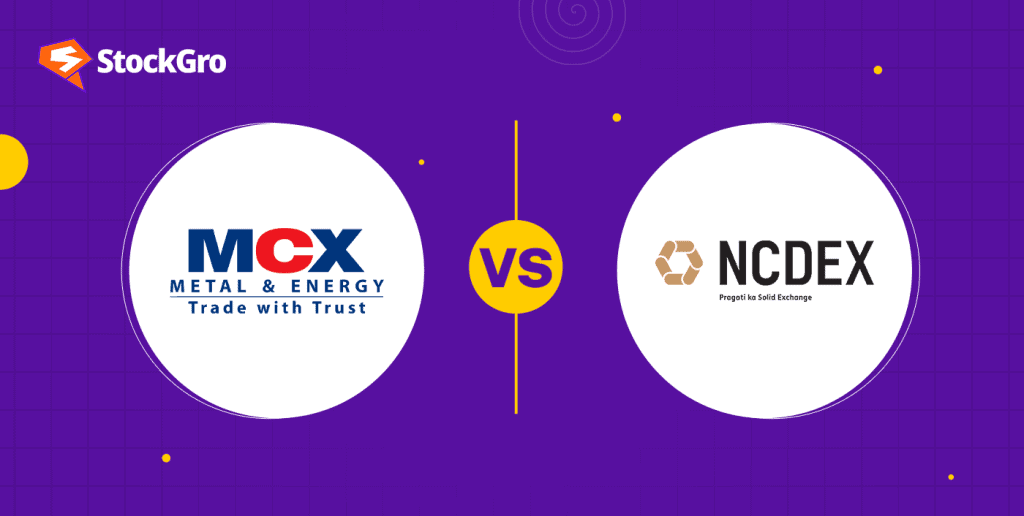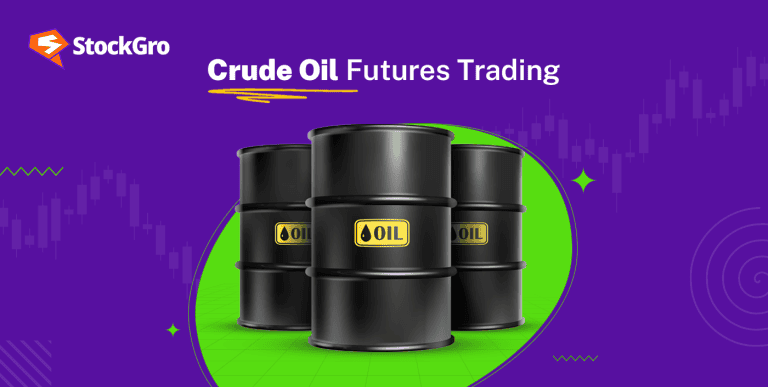
Stock trading in India is conducted on two exchanges – NSE and BSE. Similarly, commodity trading is also conducted on two different exchanges – National Commodity & Derivatives Exchange or the NCDEX and Multi Commodity Exchange or the MCX.
In this article we will discuss what is MCX and what is NCDEX and how the differences between MCX vs NCDEX and what are their similarities.
What is Multi Commodity Exchange (MCX)?
Multi commodity exchange or MCX is a commodity exchange that facilitates trading of commodity derivatives in India. MCX started its operations in November, 2003. MCX facilitates trading in derivatives of energy commodities like crude oil, precious metals or bullions like silver and gold, base metals, and natural gas and some agricultural commodities.
MCX has a series of flagship indices called MCX iCOMDEX. This series consists of a composite index, a base metal index (MCX METLDEX), a bullion index (MCX BULLDEX), an energy index (MCX ENRGDEX) and eight individual commodity indices. As on 27 Dec 2024, MCX had a volume turnover of ₹1.85 lakh crores. MCX has its own clearing corporation called MCX clearing corporation limited (MCXCCL). It works for clearing and settlement of trades executed on the multi commodity exchange.
Also read: What is a commodity? A short guide before you trade
What is NCDEX or National Commodity and Derivatives Exchange?
National commodity and derivatives exchange (NCDEX) is a commodity exchange that provides trading facility in derivative contracts of a wide range of agricultural commodities like pulses, oil and oil seeds, spices, fibers, guar complex, etc. NCDEX also provides trading facilities in a few metals.
NCDEX commenced operations in December 2003. National clearing corporation limited (NCCL) a wholly owned subsidiary of NCDEX group provides services for clearing and settlement of trades executed on the NCDEX. As on 27 Dec 2024, NCDEX had a total daily trading volume of ₹896 crores. NCDEX also provides a rain and monsoon index that gives information about rainfall in India.
Difference between MCX and NCDEX
Despite facilitating commodity trading in India, MCX and NCDEX both have many differences:
- Offerings: MCX is primarily a metal and energy exchange. It offers contracts related to base metals, precious metals and crude oil and natural gas. MCX also provides limited agricultural commodities. Whereas NCDEX is majorly focused on agricultural commodities, with a few metal offerings.
- Trading hours: MCX market trading takes place from 9:00 AM until 11:30 PM. The reason behind long trading hours is to accommodate international trading hours and align with global commodities markets. NCDEX market trading begins at 10:00 AM and ends at 5:00PM. However for some agri-commodities on NCDEX, the timing extends until 9:00 PM to account for international trading.
- Contract specification: Contracts traded on MCX come in various specifications for example, gold has four different contracts on MCX based on the lot size like gold, gold mini, gold guinea and gold petal. NCDEX, on the other hand, has more standardized contracts for agri-commodities.
- Liquidity and trading volume: MCX has much higher daily trading volume and liquidity as compared to NCDEX. MCX provides metal and energy derivatives that attract large domestic and international institutions and metal traders. The metal and energy trading is usually done on large volumes and thus the contracts traded are also in large quantities as compared to agricultural commodities.
- Settlement: MCX provides both physical and cash settlement for derivatives. It means a derivatives trader can either give or receive delivery of commodities after expiration of contracts physically or settle the difference in cash. Settlement on NCDEX is majorly done on a delivery basis that can be crucial for market players involved in agriculture.
- Influencing factors: Metal and energy commodities are influenced by global factors like supply and demand, geopolitical factors, economic conditions, etc and therefore MCX involves international players. Agri-commodities are impacted more by domestic factors like weather conditions, government policies, etc, therefore majority players on NCDEX are domestic.
| Criteria | MCX | NCDEX |
| Major Product Offerings | Main focus on metal and energy commodities | Main focus on agricultural commodities |
| Trading hours | 9:00 AM to 11:30 PM | 10:00 AM to 5:00 PM (9:00 PM for some commodities) |
| Contract specifications | Various types of contracts available for a same commodity | Standardized contracts |
| Liquidity and Volumes | Higher volume and liquidity than NCDEX | Lower volume and liquidity than MCX |
| Settlement | Physical delivery or financial settlement | Mainly physical delivery |
| Influencing factors | Metallic and energy commodities primarily influenced by international factors | Agri-commodities primarily influenced by domestic factors |
Also read: Gold vs Equities- Which is the right investment option?
Similarities between MCX and NCDEX
There are some similarities between MCX and NCDEX:
- Both exchanges are headquartered in Mumbai and both commenced operation in 2003.
- Both exchanges are regulated by the Securities and Exchange Board of India (SEBI).
- MCX and NCDEX operate from Monday to Friday and both exchanges provide a high-technology computerized platform for trading commodities.
- To eliminate counterparty risk both exchanges have their own clearing houses.
Also read: Everything you need to know about Crude oil trading in India
Conclusion
Both MCX and NCDEX ensure the smooth facilitation of commodity trading in India. MCX focuses on metals and energy and NCDEX focuses on agricultural commodities. Market participants use commodity derivatives for hedging and speculation. Always remember that prices of commodities are very volatile and commodity trading can be a very high-risk activity. It must be done only after in-depth analysis and with proper risk management and commodity trading especially must be done in highly liquid contracts only.
FAQs
- What is commodity trading?
Commodities are raw materials like metals, minerals, crude oil, agricultural products. These raw materials are used by various industries to manufacture goods for consumption or for other purposes. These raw materials change hands from miners, farmers etc; traders and industries where they are consumed and this process is called commodity trading.
- Is commodity trading risky?
Various factors like geopolitical changes, changes in government policy, etc, have the tendency to make prices of commodities very volatile. Trading in commodity derivatives leverage that amplifies the risk. So, yes commodity trading can be very risky. It must be done with proper knowledge and risk management.
- What are base metals?
Base metals are those metals that have use in a wide range of sectors like construction, electrical equipment, automobiles, engineering, etc. There are five base metals – Copper, Aluminium, Zinc, Lead and Nickle. Proper supply of base metals is essential for proper functioning of the economy.
- Why does MCX have a higher volume than NCDEX?
MCX majorly focuses on metal and energy commodities. These usually have higher trading volumes than agricultural commodities. Also, MCX has longer trading hours and involvement of big international institutions as compared to NCDEX. MCX offers a wider range of contracts as compared to NCDEX.
- Why is gold considered a safe haven asset?
Gold is a commodity that is accepted internationally and has value everywhere in the world. So, in instances of international crises like wars, pandemics etc. and economic downturns investors and governments rush to buy gold. Gold is also considered a hedge against inflation as its value increases as the value of dollars (or other currencies) decline.

